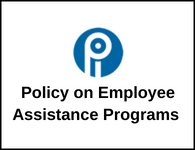Policy on Employee Assistance Programs (EAP)
Preamble
The Institute is committed to promoting, fostering, and maintaining the well-being of its members.
In order to support members and their families who may be experiencing personal, health, or work-related problems, the member’s employer may make available to members and their families a confidential, neutral, and voluntary Employee Assistance Program (EAP) that can be used without prejudice to job security or career progression.
The Institute believes that it is important to offer assistance to members facing these situations, and to encourage them to seek help voluntarily at the earliest stage, to minimize any adverse effects on their work and personal life.
Objective
The objective of this policy is to outline the Institute’s position on EAP programs in members’ workplaces.
Effective Date:
August 8, 2008
Policy Requirements:
The Institute supports Employee Assistance Programs in members’ workplaces that utilize the services of competent professional counselors or service providers. The Institute is willing to issue a joint statement with the employer reiterating labour’s and management’s support of the EAP.
The Institute acknowledges that various employers’ Employee Assistance Programs utilize members to perform the duties of a referral agent. Referral agents are specially trained employees aware of the services offered through the EAP. The Institute supports the utilization of members as referral agents where the duties and responsibilities are limited to:
- Providing confidential support and a listening ear to employees who seek their assistance, without offering or providing any form of counselling
- Providing information on EAP resources available within the employer’s organization or in the community.
- Facilitating access to in-house and contracted EAP counsellors
The Institute encourages stewards and other Institute representatives to support EAPs by:
- Promoting the program and encouraging members to take advantage of the confidential services offered by the EAP as needed.
- Advising members about the benefits of seeking help through the EAP and about the time available to access the program.
- Providing support and encouragement to members as part of the follow-up aspect of the EAP.
- Participating as members of local EAP advisory committees.
- Participating in the development of promotional and educational materials, training, and evaluation plans.
- Participating in program and contract needs identification and assessment.


